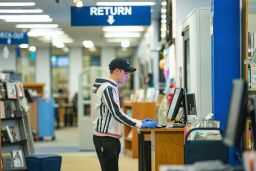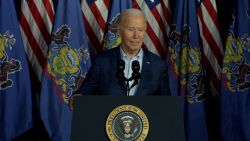Tucked into the massive $1.9 trillion Covid relief bill signed by President Joe Biden on Thursday is about $200 million for public libraries.
It’s one of the reasons Republicans have criticized the bill, which they argue is too big and includes funding for things that have nothing to do with fighting Covid or the resulting economic crisis. The final bill passed on a party-line vote, without any Republican support in the House or the Senate.
But librarians say they’ve come to the rescue for those hit the hardest by the pandemic, becoming the only way many without internet access are able to get their kids online for school – or access medical services, make vaccine appointments or register for federal aid like stimulus checks and unemployment benefits.
That’s especially true in low-income or rural areas like western Kentucky’s McCracken County, where the library got a burst of calls from people frantically trying to register for their stimulus payments after the first Covid relief package passed last year. So the library began allowing three people in at a time to use its computers and letting others access its wireless internet.
More on Covid-19 relief
“Our parking lot was filled with kids doing homework, using our WiFi, and people doing online doctor’s appointments,” said Sarah McGowan, interim director at the McCracken County Public Library. “We had to get creative.”
Since then, the library has expanded its mobile hotspot program, buying more devices that people can check out and take home for weeks at a time. When it gets more money from the latest Covid relief bill, McGowan expects they’ll use it to purchase even more hotspot devices.
“Our staff, and library staff everywhere, are flexible, good researchers, and want to help people. We’re a natural fit to do so now when there are so many online services that our patrons deeply need,” McGowan said.
$2 million at least for every state
Congress gave about $50 million to libraries when it passed its $2.2 trillion relief bill, the CARES Act, last March. The money expected from the American Rescue Plan that passed this week will send another $200 million to the Institute of Museum and Library Services, an agency that provides federal support to libraries and museums across the country.

Most of the new funds will go to state library agencies using a population-based formula, with a $2 million state minimum, according to the American Library Association.
The latest stimulus package also includes $7 billion to boost a federal program that reimburses both schools and libraries for buying laptops and hotspots to help at-home learning.
The total earmarked for libraries is less than 1% of the total $1.9 trillion American Rescue but is a huge influx of cash for the Institute for Museum and Library Services fund. The $200 million is the largest single increase in the agency’s 25-year history and worth about 80% of its annual budget.
“Libraries are a lifeline for millions of people, and the people who know that best are those who need this rescue package most,” American Library Association president Julius Jefferson said in a statement.
Filling in a gap
Over the past year, libraries helped fill in the gap when Internal Revenue Service couldn’t reach millions of low-income people who aren’t normally required to file their taxes but qualified for stimulus payments. The agency had no way to reach them and set up an online portal where bank account information and addresses could be submitted – a move that didn’t help people who don’t have access to internet.
Libraries also helped people get online to register for state unemployment benefits. The state sites were often hard to navigate and couldn’t handle the millions of new people filing last spring. And libraries stepped up to help people video conference with their doctors, interview for jobs, go to school, teach, file their taxes, and now register for the vaccine.
The money made available in last year’s stimulus package was quickly put to use in Pottsboro, Texas, a rural community outside of Dallas. When schools shut down, sending students home to learn virtually, the library used the funds to help set up mobile hotspots around town.
Poor infrastructure makes it hard to get a strong internet connection for much of the Pottsboro community, said Dianne Connery, the former director of the Pottsboro library, who now heads up special projects.
“We never closed completely during pandemic because the internet is such an essential service,” she said.
Then another need emerged. People were calling the Pottsboro Library desperate to get online for telehealth appointments with their doctors who didn’t want high-risk patients coming into the hospital or office.
By January, it had opened a dedicated telehealth room that people can reserve to video chat with the doctors. It partnered with The University of North Texas Health Science Center, which handles the appointment booking to keep personal information private, and library staff are there to help people log on if they need it.
“We get a number of people who come in and say ‘I’ve never touched a computer in my life,’ and now there are so many services that can only be done online,” Connery said.
“Libraries are a trusted place in the community. We really are well positioned to help people,” she added.
















